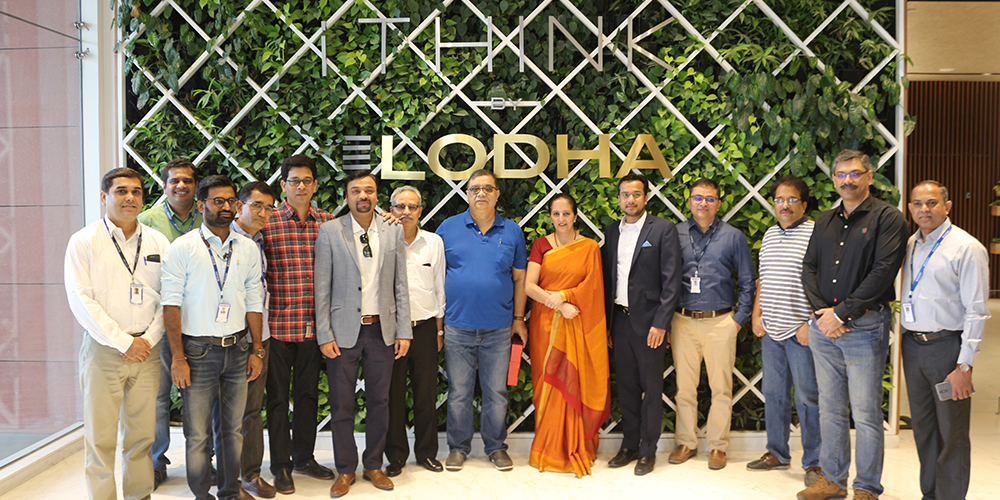
Building green homes: planet over profit

Studies show that green buildings can save up to 30% of energy and 50% of water. Builders can switch energy use to renewable sources during the construction stage itself
As the second-largest employment generator, the contribution of the real estate sector to the growth of the national economy is not new. In recent times, with people realising the significance of owning homes, there has been a structural transformation in housing demand, further resulting in a boost to the sector. Validating the same is a recent report titled ‘Real Estate Industry: Outlook and Challenges’ by Infomerics Valuation and Rating, which states that the Indian real estate industry is on course for sustained high growth at over 75% Y-o-Y for the next three years. An IBEF report too highlights that the industry is expected to reach a $1 trillion market size by 2030 and contribute 13% to the GDP by 2025.
This scale of growth offers an unprecedented opportunity to move away from resource-intensive and archaic development approaches to a more climate-conscious and low-carbon approach. There is no reason of locking in immense amounts of carbon emissions in the urbanisation that happens during this decisive decade when the most aggressive decarbonisation is the need of the hour. Also, according to the UN Environment Programme, the construction and operation of buildings contribute to around 40% of the total global carbon emissions. Real estate can therefore be the medium of big change by its innate existence across all sustainability-driven concerns.
Eco-conscious solutions
There is a noticeable shift among present-day consumers to lead a sustainable lifestyle. Also, educated and responsible homebuyers are increasingly welcoming eco-conscious real estate solutions, besides preferring green-certified buildings by grade A developers. According to a CBRE South Asia report, India has witnessed a 31% increase in green real estate assets across the top six cities — NCR, Mumbai, Pune, Hyderabad, Bengaluru, and Chennai — in the last decade.
Studies show that green buildings can save up to 30% of energy and 50% of water. Through sustainable design, construction and operations, green buildings are climate-resilient, consume less water, optimally use energy, conserve natural resources, generate less waste, and enhance biodiversity. As a result, they ensure a better liveability quotient by providing better ventilation, adequate daylight, superior air quality, and overall well-being. From an economic viewpoint too, green homes reduce the operating costs of buildings, improve productivity and efficiency, and provide higher ROI, higher asset/rental value, rebates on property taxes, and savings on recurring costs like electricity, water, medical, etc., bills.
Developers need to set science-based decarbonisation targets. These targets also usher innovation and competitiveness in the field. Ultimately, saving resources saves costs and makes the development as well as the developer resilient to policy changes, thereby unlocking value and future-proofing growth. Developers must also consider climate science to evaluate the physical climate risks that affect the geography where they are developing their real estate.
Successful pilot projects can provide opportunities to scale up feasible solutions and achieve significant emission reductions. The entire process can be formulated in alignment with internationally recognised accounting and reporting standards like the GHG (greenhouse gas) Protocol. Tapping the entire building lifecycle is important in this regard; this can help provide clear targets for each impact category and project stage.
Friendly materials
For reducing GHG emissions and greening the project lifecycle, leading developers can also switch energy use to renewable sources during the construction stage itself. Circularity concepts like ‘reduce, reuse, recycle’ should be at the core while designing green projects with increased integration of environment-friendly construction materials. The government and regulatory bodies have also taken several steps to incentivise and encourage sustainable business practices within real estate. An allocation of ₹19,500 crores has been made by the central government in the Union Budget 2022 to boost the manufacturing of solar modules under its flagship production-linked investment (PLI) scheme. Both government policies and investors’ focus are incentivising the developers engaged in climate adaptive and green developments. Furthermore, a partnership ecosystem is essential to achieve sustainability targets, with city regulators playing a key role in enabling the decarbonisation of the built environment along with investors, landlords, and occupiers. Wider stakeholder engagement helps ensure acceleration towards achieving net-zero targets.
With the ‘planet over profit’ dictum gaining prominence, sustainability as an economic risk has become the dominant discussion point across board rooms. Responsibly built green developments can contribute significantly to India’s vision of reducing its total carbon emissions by one billion tonnes by 2030 and reaching its net-zero target by 2070. A JLL report titled ‘Sustainable Real Estate: India’s response to a greener future’ reveals that 81% of respondents see real estate as a game-changer in achieving the sustainability agenda. As a rapidly transforming corporate landscape looks to align itself with the low-carbon economic agenda by adopting aggressive net-zero carbon goals, the real estate industry must stay afoot and be at the centre of these systemic developments for a greener future.
By Aun Abdullah, ESG Leader, Lodha
Published in The Hindu
TAGS
Similar Blog Posts

Benefits of Investing in Rea...
Here we take a look at the benefits of investing in real estate, the various sops available for w
TAGS

Ensuring quality is at the f...
The real estate sector in India has been multiplying over the past few years. With increased popu
TAGS

How living on rent can impac...
When moving to a new city for employment, rather than buying a house people preferred renting a h
TAGS

The journey of women from ho...
According to a report by Investment banker Morgan Stanley, millennials are a key force that drive
TAGS

South Central Mumbai: Hub fo...
One of the finest locations in the city of Mumbai - South Central Mumbai is house to some of the
TAGS

It is time to take the leap ...
Owning a home is an essential priority for each individual and an aspiration that one desires to
TAGS
Celebrating Excellence with ...
We are thrilled to announce that Lodha has been honored by Great Place To Work (GPTW) u
TAGS

Building a better life, shap...
During the last few decades, we have grown as a company, and a nation, at an unprecedented rate.
TAGS

Why This is The Right Time t...
Over the past couple of years Mumbai has undergone a sea of transformation. With several key infr
TAGS

Shifting consumer preference...
The last two years have been filled with life lessons for every individual. This has been a time
TAGS

HDFC Bank anchors at Palava...
The first commercial tower of Lodha Group’s Palava, recognized as India’s No.1 Liveable City*
TAGS
palava offices
Why real estate continues to...
Given that real estate is always under scrutiny, it is evident that most people don’t understan
TAGS

Mumbai upbeat on digital pus...
RERA is an Act to establish a regulatory body for regulation and promotion of the real estate sec
TAGS
Digital
Redefining real estate, deve...
With meticulous planning, attention to detailing, focus on quality & great craftsmanship we h
TAGS

Thane the Most Preferred Loc...
A larger, more popular subject usually overshadows a small one. This can be true for people, plac
TAGS

HDFC Bank Welcomed at iThink...
Shaishav Dharia, Regional CEO, Lodha Group, welcomes Ms. Ashima Bhat , Country Head - Finance, St
TAGS
palava
The Rise of Hospitality in M...
As the world of luxury has shifted away from a high price tag and brand/product-centricity and mo
TAGS
Luxury
Sustainable Real Estate: The...
According to a recent report by IBEF, the real estate sector in India is expected to reach a mark
TAGS

Developers May Alter Home De...
With the new health and safety concerns, homebuyers are now giving more emphasis to the location
TAGS

Women of today: New age real...
Women have been the most significant influencers when making the crucial decision of buying a hom
TAGS

Lodha to create over 10,000 ...
Lodha Group, India’s largest residential estate player, today announced that it will be launchi
TAGS

Plots and Villas: The new em...
With an emerging need for a low density living accompanied by the necessary social distancing mea
TAGS

World Water Day: Ways For Su...
All ancient human civilizations were born and flourished around water. How essential water is for
TAGS

Pivot or Perish: The Real Es...
Mint’s Pivot or Perish webinar held last month focused on the impact of COVID-19
TAGS

Homebuyer Trends That Are Re...
In the past decade, the concept of luxury has experienced an evolution from something that was sy
TAGS

New Homebuyers Looking for O...
The right balance between nature and modern infrastructure has inspired people to live in one of
TAGS

Powai: A Prime Real Estate H...
Witnessing the huge demand and the growth prospects, Grade A developers are fortifying their pres
TAGS

Green Advantage...
Today, environmental sustainability is key in homebuying and investment decisions. Grade-A develo
TAGS

Lodha Pay – Book your Drea...
Lodha Pay is introduced to provide safe and secure, online payment option to our customers.<
TAGS
Services
Green And Sustainable Living...
Our homes are safe havens for us and our families. With a significant change in lifestyles and th
TAGS

How Homeownership Helps in E...
A child’s environment plays a major role in their development because it includes the surroundi
TAGS

Changing housing paradigm bo...
A home is no longer just a substantial investment – it offers the security of a much deeper, mo
TAGS

Save water in building const...
As a matter of fact, water is becoming scarcer as local sources are constantly depleting and disa
TAGS

COVID Impact: Private Garden...
With the world progressively adapting towards the post Covid-19 lifestyle, consumer needs are als
TAGS
Residential
COVID-19 – what it means f...
Amidst the uncertainty that has engulfed the world, we understand you maybe in two minds about pu
TAGS

How your home can make you h...
Aside from the obvious financial benefits of home ownership, there are also many social, psycholo
TAGS

Mixed Use Developments to Se...
As we start thinking of living in the post-COVID world, there are diverse perspectives on how cit
TAGS

Own or Rent A House During t...
Since the outbreak of COVID-19 pandemic those staying on rent are left questioning their choice.
TAGS
Residential
Lodha Group Sells Rs. 3000 c...
Lodha Group: India’s No. 1 Real-Estate Developer announces the sale of INR 3000 cro
TAGS

Strengthening our Community ...
In these unexpected times where the country is facing simultaneous health and economic challenges
TAGS

5 Reasons Why You Should Buy...
COVID-19 has made us realise the importance of owning a home. The sense of security and comfort d
TAGS
Residential
Factors You Should be Aware ...
If you’re in the market looking to buy a house, it’s likely that you may have been charmed by
TAGS

59% Homebuyers Looking for R...
A recent consumer research done by Lodha Developers with active home seekers in Mumbai region dur
TAGS
Lifestyle Residential
Hassle-Free Home Owning Expe...
At Lodha Group, our passion is to create landmarks that meet global standards. Every one of our d


